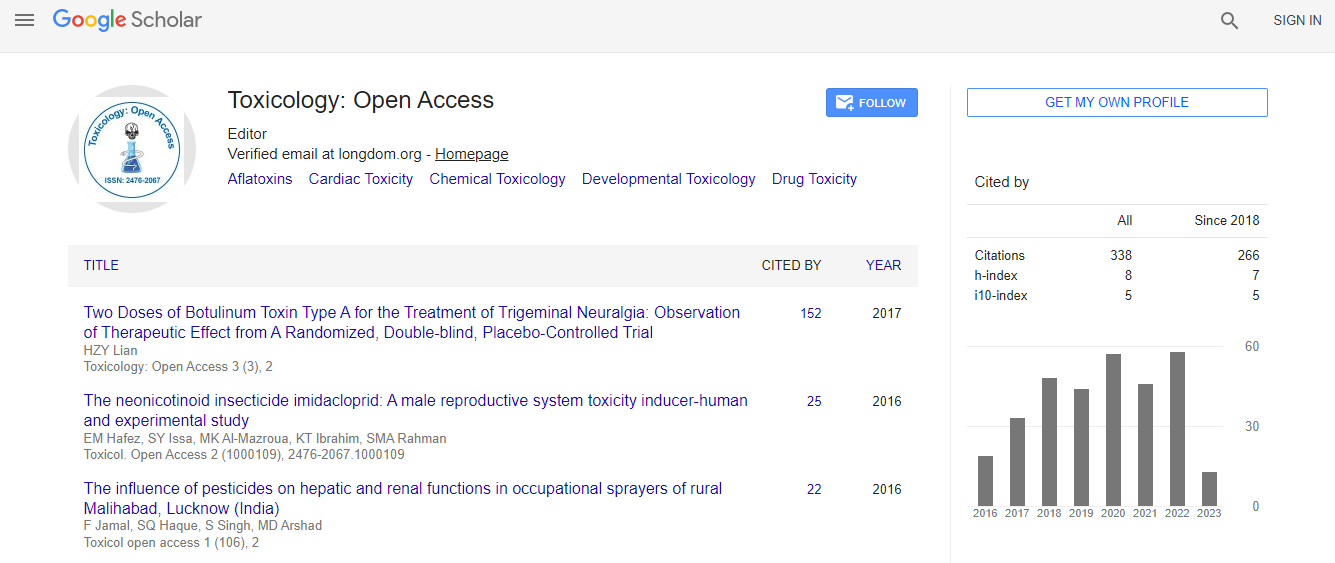Our Group organises 3000+ Global Conferenceseries Events every year across USA, Europe & Asia with support from 1000 more scientific Societies and Publishes 700+ Open Access Journals which contains over 50000 eminent personalities, reputed scientists as editorial board members.
Open Access Journals gaining more Readers and Citations
700 Journals and 15,000,000 Readers Each Journal is getting 25,000+ Readers
Google Scholar citation report
Citations : 336
Toxicology: Open Access received 336 citations as per Google Scholar report
Indexed In
- Google Scholar
- RefSeek
- Hamdard University
- EBSCO A-Z
- Geneva Foundation for Medical Education and Research
- Euro Pub
- ICMJE
Useful Links
Related Subjects
Share This Page
Phytotherapy: Transition of tradition to technology with special reference to anti-tuberculosis drugs
8th World Congress on Toxicology and Pharmacology
Sangeeta Shukla, Neelu Sinha and Amita Jaswal
Jiwaji University, India
ScientificTracks Abstracts: Toxicol Open Access
Abstract
Statement of Problem: Anti-tuberculosis drug (ATD)-induced hepatotoxicity is a major impediment for the effective treatment of tuberculosis (TB). All first-line anti-TB medications have adverse effects that interrupt the successful completion of TB treatment. This study was planned to investigate the evaluation of the protective role of phytotherapy (Phyllanthus amarus (PA) and Nigella sativa (NS) and their active principles, Phyllanthin and Thymoquinone) against liver injury caused by ATDs. Methodology & Theoretical Orientation: Rats were treated with ATD for 8 weeks (3 days/week) as given for the treatment of TB. This was followed by phytotherapy for 8 weeks (3 days/week). Findings: Administration of combined ATDs induced hepatotoxicity was evident from a significant elevation in the AST, ALT, ALP, bilirubin, albumin, cholesterol, urea, uric acid, creatinine, LPO and decreased activities of enzymes, i.e., SOD, CAT, GR, GPX and G6PDH in liver. ATD significantly increased TNF-�±, IL6, IL10 and DNA damage and showed sharp depletion in CYP2E1 activity as assessed by estimating AH and AND activity. These altered variables were significantly reversed towards normal after treatment with phytotherapy. Histological studies (LM & EM) also supported biochemical findings confirming the effectiveness of therapeutic agents. Conclusion & Significance: Results of this study strongly indicated protective effect of phytotherapy and thus, can be expected as promising protective agent in maintenance of normal hepatic function during treatment with ATD.Biography
Sangeeta Shukla is Vice Chancellor of Jiwaji University, Gwalior (MP) India. She has wide experience of research in the field of Biochemical Pharmacology, Environmental Toxicology and Reproductive Biology. She has been awarded fellowship from Welcome Trust, Indo-French Government Fellowship UK and many others. She has published 113 papers in SCI journals with good citation indices. She has also edited a book and contributed chapters in books. In recognition of her efforts, she held international positions as Vice President for Asian Continent of International Centers for Trace Element Study for UNESCO, France including Council Member of ISTERH. She has completed 20 major research projects and supervised 21 PhD thesis and many dissertations of MPhil and MSc students.
Email: profsshukla@gmail.com

 Spanish
Spanish  Chinese
Chinese  Russian
Russian  German
German  French
French  Japanese
Japanese  Portuguese
Portuguese  Hindi
Hindi 